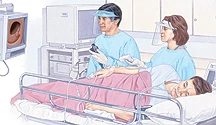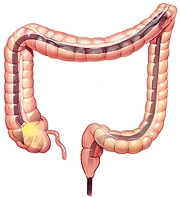Colonoscopy is used to view the inside of your lower digestive tract (colon and rectum). It can help screen for colon cancer and can also help find the source of abdominal pain, bleeding, and changes in bowel habits. The test is usually done in the hospital on an outpatient basis. During the exam, the doctor can remove a small tissue sample ( a biopsy) for testing. Small growths, such as polyps, may also be removed during colonoscopy.

Getting Ready
- Be sure to tell your doctor about any medications you take. Also tell your doctor about any health conditions you may have.
- Discuss the risks of the test with your doctor. These include bleeding and bowel puncture.
- Your rectum and colon must be empty for the test. So be sure to follow the diet and bowel prep instructions exactly. If you don’t, the test may need to be rescheduled.
- Ask your doctor whether you need to have a friend or family member prepared to drive you home after the test.

During the Test
- You are given sedating (relaxing) medication through an IV line. You may be drowsy or completely asleep.
- The procedure takes 30 minutes or longer.
- The doctor performs a digital rectal exam to check for anal and rectal problems. The rectum is lubricated and the scope inserted.
- If you are awake, you may have a feeling similar to needing to have a bowel movement. You may also feel pressure as air is pumped into the colon. It’s okay to pass gas during the procedure.
After the Test
- You may discuss the results with your doctor right away or at a future visit.
- Try to pass all the gas right after the test to help prevent bloating and cramping.
- After the test, you can go back to your normal eating and other activities.
Risks and Possible Complications Include:
- Bleeding
- A puncture or tear in the colon
- Risks of anesthesia
